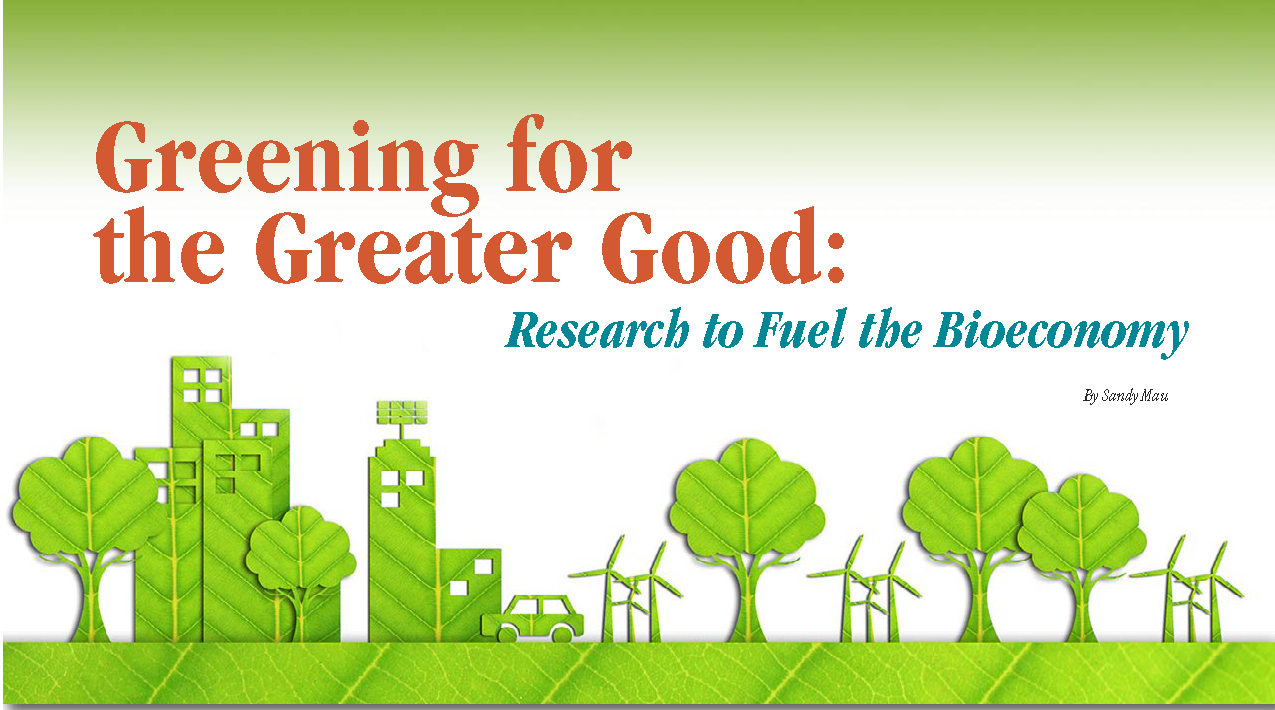Greening for the Greater Good: Research to Fuel the Bioeconomy
This post is an excerpt from an article appearing in NCURA’s Oct/Nov 2022 issue. Download the full article.
In 1973, the field of biotechnology was fundamentally transformed when biochemists Stanley N. Cohen and Herbert W. Boyer successfully transplanted genes from one organism to another. In the nearly 50 years since, capabilities to map and edit human, animal, and plant genomes rapidly advanced alongside breakthroughs in nanotechnology, sensing, and bioinformatics. Enabled by engineering, information science, and computing, bioeconomy research and development promises to revolutionize everything from medicine to materials and from food to fuel.
There is immense potential for transformative biotechnology solutions to improve society and quality of life. Representing 5.1% of U.S. gross domestic product in 2016—nearly $1 trillion—the bioeconomy is flourishing as companies and universities produce applications in agriculture, biomedicine, and bioindustrial sectors. [1] As institutions and companies look to reduce their carbon footprint in the coming decades, investment in biotechnology research has never been more urgent.
Safeguarding the investment from government and commercial sources while ensuring that the United States maintains a leading position in new biotechnology discoveries and translational applications is a priority for the U.S. National Science Foundation (NSF). This was the impetus behind a series of five workshops conducted on behalf of the NSF Biology Directorate by UIDP (uidp.org), a non-profit membership organization comprised of leading innovation companies and research-intensive universities. Beginning in July 2021, UIDP convened interdisciplinary groups of scientists in virtual, two-day workshops to examine specific biotechnology areas where increased research activity could yield results that translate into real-world solutions. The invitation-only events engaged researchers from academia, industry, and government to identify research areas ripe for partnership and collaboration.
“We know that the world’s greatest challenges can be addressed with effective, cross-sector collaboration. Governments around the world are ready to invest, sometimes in partnership with industry and nonprofits, in research that can rapidly result in discovery and solutions at scale,” said Anthony Boccanfuso, UIDP’s president and CEO.
Why does this matter to research leadership? To paraphrase hockey great Wayne Gretzky, smart leaders steer to where the research activity is going to be. UIDP’s 2018 workshop, “Catalyzing Industry-University Collaboration in Quantum Technologies,” was similarly conducted in collaboration with the NSF and helped inform collaborative research directions in that critical area. NSF has established university-industry collaborative research centers to bolster the nation’s standing in quantum science and technology.
University research leadership can play a critical role in highlighting the findings from these visioning events that point to critical issues on collaboration and topics of highest priority. Academic research in bioeconomy topics, especially when pursued in collaboration with industry partners, has the potential to vastly accelerate R&D advances that provide substantial societal benefit.
“Biotechnology is one of NSF’s Emerging Industries and a priority area that engages all directorates across the agency,” said Theresa Good, division director for the Division of Molecular and Cellular Biosciences at NSF and chair of the agency’s Bioeconomy Coordinating Committee. “In the past, our investments in fundamental and use-inspired research, infrastructure, and the workforce have advanced the U.S bioeconomy as exemplified by directed evolution enabled biocatalyst design, gene editing enabled acceleration of the development of cellular therapies and bioprocesses for materials, and PCR enabled advances in rapid sequencing and identification of SARS-CoV-2 and other pathogens. All of those enabling technologies: PRC, gene editing via CRISPR, and directed evolution, were the product of curiosity driven discovery research.”
The UIDP bioeconomy workshop visioning series focused on five research themes. Reports from the workshop elucidating critical topics and advancements needed to pave the way for translational research point to distinct gaps in the current research landscape for each topic area that can be advanced by collaborative, cross-disciplinary research at the interface between basic and use-inspired research. Key takeaways for research leadership from the first three reports, available publicly on the UIDP website, are explored in this article. Download the full article.
[1] National Academies of Sciences, Engineering, and Medicine. 2020. Safeguarding the Bioeconomy. Washington, DC: The National Academies Press. https://doi.org/10.17226/25525.



